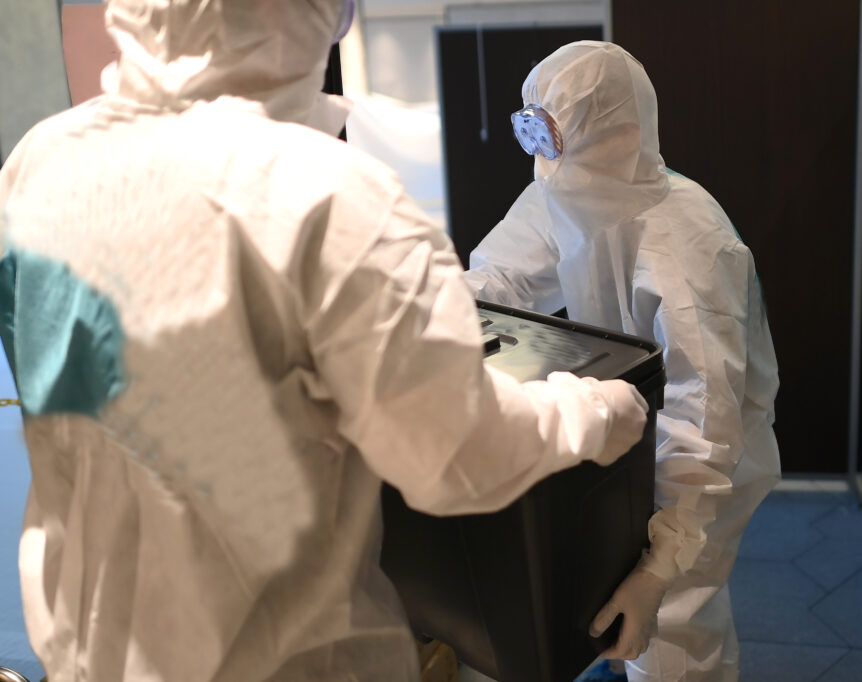How Hard Is Crime Scene Cleanup?
Crime scenes can be incredibly distressing, and traumatizing for those involved. The aftermath of these scenes can leave behind hazardous materials such as bodily fluids, blood, hazardous chemicals, toxins, and other hazards that pose a threat to the health and safety of everyone in the area. The process of cleaning up a crime scene requires specialized knowledge, training, and expertise in biohazard remediation services.
Crime scene cleanups are a complex, dangerous, and challenging process. Crime scene cleanup technicians experience intense exposure to hazardous materials and must abide by strict protocols and regulations to remain safe throughout the cleanup. In this article, we will explore the challenges and dangers involved in crime scene cleanup.
What does Crime Scene Cleanup Involve? Crime scene cleanup is a highly specialized field that requires the skills and expertise of trained and certified professionals. Crime scene cleanup involves the process of cleaning up hazardous materials and bodily fluids left behind after a traumatic event.
The process of crime scene cleanup begins with an assessment of the area to determine the extent of the damage and the appropriate type of cleanup required to restore the site to its original state. The next step involves the quarantine of the affected area, typically using warning signs, and barriers to keep unauthorized personnel out of the space.
Once the crime scene has been secured, the cleanup team removes all visible debris and hazardous materials. They then proceed with the deep cleaning and sanitization of the affected surfaces to remove all traces of the biohazardous materials. The final step of the cleanup process is a validation test that ensures that the space is safe for resumption.
What are Some of the Dangers of Crime Scene Cleanup?
- Biohazardous Materials. One of the significant dangers of crime scene cleanup is exposure to biohazardous materials. Bodily fluids, blood, and other hazardous materials can contain bacteria, viruses, and other pathogens that can cause serious illness or infections.
- Bloodborne Pathogens. Bloodborne pathogens are microorganisms found in human blood that can cause diseases such as Hepatitis B, Hepatitis C, and HIV/AIDS. Cleanup workers who handle bodily fluids, blood, and other hazardous materials must abide by strict protocols and regulations to minimize the risk of exposure.
- Emotional Experience. The emotional experience of entering a crime scene can be extremely difficult. The remnants of a traumatic event can be overwhelming and emotionally taxing on cleanup professionals. Cleanup personnel must remain focused and grounded during the cleaning process to avoid making mistakes or taking undue risks.
- Chemical Exposure. Blood isnt the only substance that requires cleaning up. Hazardous chemicals and toxic substances from drug labs, for instance, can create a hazardous environment for people in the vicinity. Chemical exposure can cause respiratory issues, skin irritation, and other severe health problems.
- Sharp Objects and Injuries. Cleanup technicians may also encounter sharp objects such as broken glass, needles, and other debris that could cause potential hazards and injuries. Cleanup teams need proper training and protective gear to minimize the risk of injury.
- Equipment Safety. Cleanup equipment such as respirators, gloves, goggles, and other PPE can be heavy and limiting in movement, especially during a crime scene cleanup process. The gear can impair vision, hearing, communication, physical mobility, and other senses, which could pose a hazard to workers on site.
- Health Risks. Professional crime scene cleanup workers are at risk of developing several health issues associated with exposure to biohazardous materials, including respiratory problems, headaches, nausea, skin irritation, and other health effects.
How Difficult is Crime Scene Cleanup? Crime scene cleanup is a highly specialized field that involves stringent safety procedures, specialized equipment, and extensive training. The cleanup process can be physically and emotionally demanding, requiring sensitive handling and proper disposal techniques for hazardous materials.
In addition to the above mentioned dangers, the tasks involved in crime scene cleanup are often gruesome, traumatic, and complex to manage. Beyond the technical aspects, cleanup crews must also show empathy and sensitivity when dealing with families, friends, and colleagues affected by the tragedy.
Crime scene cleanup can also be a highly competitive industry, requiring companies to operate 24/7, 365 days a year. The job requires fast response times, flexible schedules, and quick turnaround times, which can also be challenging to manage.
Why Hire Crime Scene Cleanup Professionals? The risks and complexities involved in crime scene cleanup make it imperative to hire professionals to handle the job. Crime scene cleanup professionals are trained to manage all aspects of biohazardous materials, including proper disposal, decontamination, and cleaning.
Professional crime scene cleanup teams also have specialized equipment designed to enable them to contain and remove all hazardous materials safely. They wear appropriate protective gear to minimize the risk of exposure to biohazards while cleaning up the affected areas thoroughly and restoring them to their pre-existing condition.
Crime scene cleanup professionals understand the sensitivity and trauma associated with crime scenes, doing their utmost to handle the situation with respect, compassion, and empathy. They are trained to communicate effectively with affected parties, ensuring that all concerns are handled with care and empathy.

